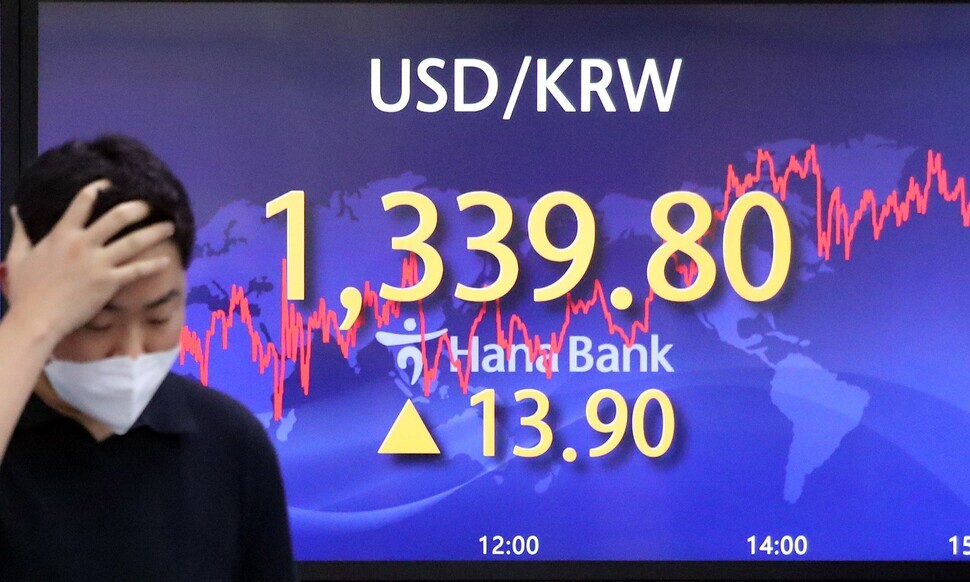hankyoreh
Links to other country sites 다른 나라 사이트 링크
Won continues to depreciate against strong dollar, hitting more than 13-year low

The won-dollar exchange rate exceeded 1,330 won for the first time in more than 13 years on Monday. This is mainly due to the US dollar racking up strength amidst the prospect of further US interest rate hikes and concerns of a potential recession in Europe.
According to market trends, the won-dollar exchange rate may soar to the upper 1,300-won range before the end of the year.
On Monday, the won-dollar exchange rate closed at 1,339.8 won in the Seoul foreign exchange market, up 13.9 won from the previous trading day. The exchange rate on Monday started off at 1,335.5 won, then climbed up to 1,340.2 won during afternoon trading, and ended the day after dropping just below 1,340 won.
This marks the first time in 13 years and 4 months that the won-dollar exchange rate breached the 1,330-won mark, the last being on April 29, 2009, when the exchange rate stood at 1,340.7 won to the dollar.
In 2009, the exchange rate fluctuated due to growing fears of an economic recession after the global financial crisis.
While the dollar is once again growing in power, the value of the won is plummeting. The US dollar index, which fell to 104 earlier this month, recently rebounded to 108.
Repeated hawkish remarks made by the US Federal Reserve are also believed to have had an impact.
In particular, market watchers are on high alert for Fed Chair Jerome Powell's scheduled remarks at the upcoming conference of central banks slated for Aug. 25 in Jackson Hole, Wyoming, in the US.
Concerns are also high regarding the darkening economic outlook centered on Europe and China.
In Europe, many say that an energy crisis is becoming increasingly visible due to Russia’s restrictions on natural gas supply to Europe. As the economy takes a hit, inflation is expected to worsen due to the simultaneous soaring of gas prices.
Similarly, in China, various real economic indicators are recording low numbers due to the impact of the COVID-19 pandemic, further raising concerns.
Meanwhile, the worsening trade balance also has a direct impact on the value of the Korean won.
According to data released Monday by the Korea Customs Service, South Korea’s trade balance recorded a deficit of US$10.21 billion so far this month (Aug. 1-20), further raising the possibility that Korea will post its fifth consecutive month in the red.
The balance of goods, including transit trade, is still in the black, but the surplus of the deficit is on the decline.
Even though the balance of payments may improve with the recent decrease in international oil prices, the improvement is expected to be limited given gas supply shortages and the sluggish economic growth of Korea’s major trading partners.
Market experts are also saying that the won-dollar exchange rate could soon breach the 1,350-won mark.
“The threat of the 1,350 won level in the won-dollar exchange rate has also entered the visible range,” according to a report by Park Sang-hyeon and Ryu Jin-lee, researchers at Hi Investment & Securities.
Similarly, in late July, Kwon A-min, a researcher at NH Investment & Securities, predicted the upper limit of the won-dollar exchange rate to be 1,380 won in the fourth quarter of this year.
By Lee Jae-yeon, staff reporter
Please direct questions or comments to [english@hani.co.kr]

Editorial・opinion
![[Guest essay] Preventing Korean Peninsula from becoming front line of new cold war [Guest essay] Preventing Korean Peninsula from becoming front line of new cold war](https://flexible.img.hani.co.kr/flexible/normal/500/300/imgdb/original/2024/0507/7217150679227807.jpg) [Guest essay] Preventing Korean Peninsula from becoming front line of new cold war
[Guest essay] Preventing Korean Peninsula from becoming front line of new cold war![[Column] The state is back — but is it in business? [Column] The state is back — but is it in business?](https://flexible.img.hani.co.kr/flexible/normal/500/300/imgdb/original/2024/0506/8217149564092725.jpg) [Column] The state is back — but is it in business?
[Column] The state is back — but is it in business?- [Column] Life on our Trisolaris
- [Editorial] Penalties for airing allegations against Korea’s first lady endanger free press
- [Editorial] Yoon must halt procurement of SM-3 interceptor missiles
- [Guest essay] Maybe Korea’s rapid population decline is an opportunity, not a crisis
- [Column] Can Yoon steer diplomacy with Russia, China back on track?
- [Column] Season 2 of special prosecutor probe may be coming to Korea soon
- [Column] Park Geun-hye déjà vu in Yoon Suk-yeol
- [Editorial] New weight of N. Korea’s nuclear threats makes dialogue all the more urgent
Most viewed articles
- 1Behind-the-times gender change regulations leave trans Koreans in the lurch
- 2Family that exposed military cover-up of loved one’s death reflect on Marine’s death
- 3Yoon’s revival of civil affairs senior secretary criticized as shield against judicial scrutiny
- 4South Korean ambassador attends Putin’s inauguration as US and others boycott
- 5Marines who survived flood that killed colleague urge president to OK special counsel probe
- 6‘Weddingflation’ breaks the bank for Korean couples-to-be
- 7Yoon’s broken-compass diplomacy is steering Korea into serving US, Japanese interests
- 8Hybe-Ador dispute shines light on pervasive issues behind K-pop’s tidy facade
- 9Lee Jung-jae of “Squid Game” named on A100 list of most influential Asian Pacific leaders
- 10[Guest essay] Preventing Korean Peninsula from becoming front line of new cold war